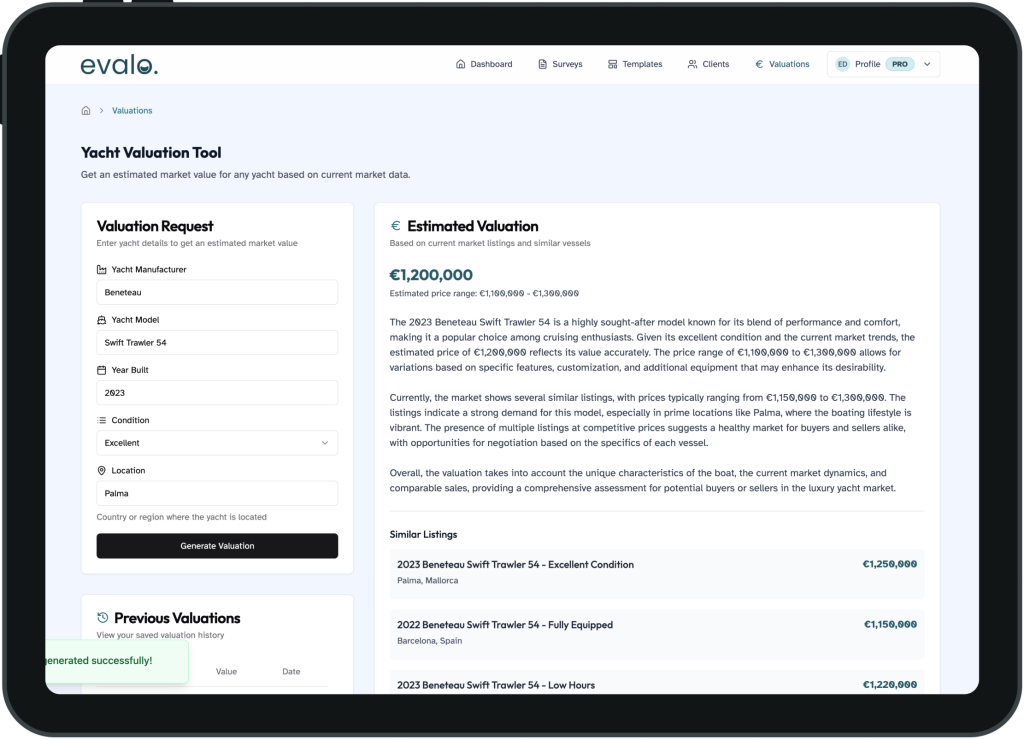In the ever-evolving world of marine surveying, yacht valuation remains a cornerstone of a surveyor’s expertise. Whether it’s for insurance, resale, financing, or legal matters, a precise and defensible valuation is essential. At Evalo, we support yacht surveyors across the UK and Europe with the tools they need to make accurate assessments. In this blog post, we delve deep into the fundamentals of yacht valuation, offering practical guidance and expert insight tailored specifically for professional yacht surveyors.
Why Yacht Valuation Matters
Yacht valuations are critical for multiple stakeholders:
- Buyers and sellers rely on fair market value assessments.
- Insurers need accurate valuations to determine premiums.
- Finance providers base lending decisions on current vessel value.
- Legal professionals use valuations in disputes or probate cases.
For surveyors, producing an accurate valuation is not only a professional responsibility but a key differentiator in a competitive market. It reflects technical knowledge, market awareness, and integrity.
Key Valuation Methodologies
There are three primary approaches to yacht valuation. Each method has its place depending on the purpose of the valuation and the condition and uniqueness of the vessel.
1. Market Comparison Approach
This is the most widely used and accepted method, especially for production yachts.
Steps Involved:
- Identify comparable vessels (make, model, year).
- Adjust for differences in condition, equipment, and location.
- Analyse recent sales data and listings.
Tips for Surveyors:
- Focus on actual sold prices rather than asking prices.
- Consider seasonality and market trends.
- Use multiple data sources (brokerage databases, classified sites, auction results).
2. Cost Approach
This method is useful for custom yachts or when comparable sales data is limited.
Steps Involved:
- Estimate the replacement cost of the vessel (new build price).
- Deduct depreciation based on age, wear, and obsolescence.
When to Use:
- Custom-built yachts
- Unique or heavily modified vessels
- Legal or insurance valuations where precision is critical
3. Income Approach
Rarely used in private yacht surveying but relevant for commercial vessels or charter yachts.
Steps Involved:
- Project future income (charter revenue, operational cost).
- Discount future cash flows to present value.
Note: This method requires detailed financial records and market forecasts.
Key Factors Affecting Yacht Value
Valuation is both a science and an art. Surveyors must weigh technical observations alongside market data. Here are the primary factors that influence a yacht’s value:
1. Age and Condition
- Hull integrity: Osmosis, blistering, delamination.
- Engine hours: Lower hours can mean higher value.
- Interior condition: Modern finishes, odours, and wear.
- Maintenance records: A well-documented service history adds value.
2. Builder Reputation and Model Popularity
- High-demand brands (e.g., Beneteau, Jeanneau, Hallberg-Rassy) hold their value better.
- Limited production models may be worth more to collectors or niche buyers.
3. Equipment and Upgrades
- Electronics, sails, rigging, and safety gear all impact valuation.
- Recent refits or upgrades can significantly increase market appeal.
4. Location
- Boats in Northern Europe might command different prices than similar vessels in the Med due to climate, salt exposure, and usage patterns.
5. Market Conditions
- Interest rates, fuel costs, and even global events (like pandemics) can affect demand.
- Stay up-to-date with brokerage reports and marine market indices.
Common Pitfalls in Yacht Valuation
Even experienced surveyors can fall into traps. Avoid these common mistakes:
- Relying solely on asking prices. These can be inflated and don’t reflect the true market.
- Ignoring equipment devaluation. Electronics and sails depreciate faster than hulls.
- Using outdated comparables. The market moves quickly—always use data from the past 6-12 months.
- Not clearly stating assumptions. A defensible valuation must include your methodology and assumptions.
Tools and Resources for Surveyors
Accurate valuation depends on reliable data and professional tools. Here’s what we recommend:
- Evalo.tech: Our software provides UK and EU surveyors with structured reporting tools, condition checklists, and valuation frameworks.
- YachtWorld, Boatshed, TheYachtMarket: Valuable for gathering comps and market listings.
- Marine Blue Book and Soldboats.com: Offer historical sales data.
- Surveyor Networks and Forums: Engage with fellow professionals to compare insights.
How Evalo Can Help
Evalo is designed specifically with yacht surveyors in mind. Our valuation module is designed specifically for yacht surveyors who demand speed, precision, and confidence in their assessments. This feature leverages real-time market data and advanced algorithms to deliver accurate, data-driven valuations based on comparable vessels, eliminating guesswork and saving hours of manual research.

Final Thoughts: The Surveyor’s Role in Valuation
Valuation is more than just a number—it’s a professional opinion backed by experience, market insight, and technical understanding. As a yacht surveyor, your valuation reports serve as a critical touchpoint for clients making high-value decisions.
By mastering the principles of valuation and using the right tools, you not only enhance your credibility but also strengthen your business offering in a competitive market.
Stay informed, be methodical, and always document your rationale. And remember: an accurate valuation today builds trust and business tomorrow.
